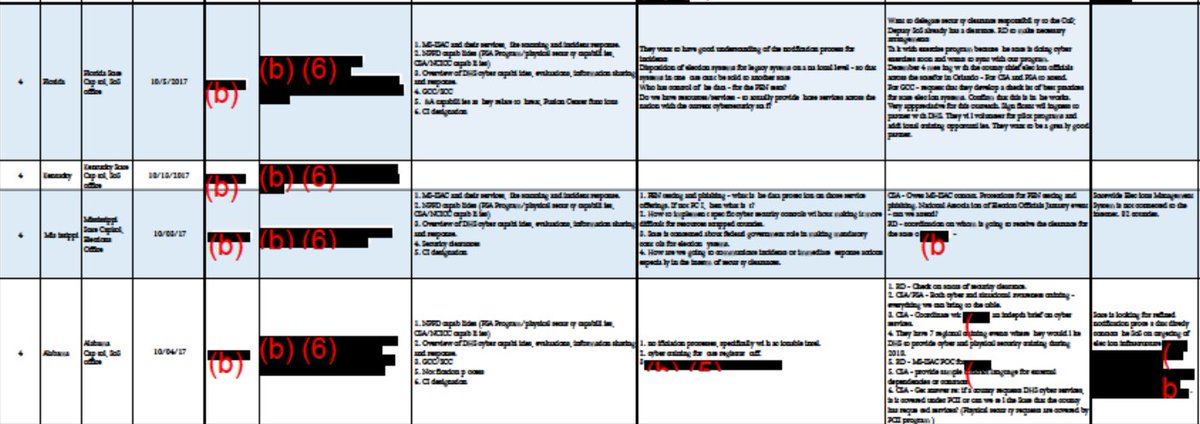DHS just gave @EPICprivacy more documents related to its early election security work.
The docs, disclosed as part of an ongoing FOIA lawsuit, contain some interesting, funny, and depressing revelations about DHS's early scramble to secure election systems.
Some highlights:
The docs, disclosed as part of an ongoing FOIA lawsuit, contain some interesting, funny, and depressing revelations about DHS's early scramble to secure election systems.
Some highlights:
First, an incident report log from July/August 2016 contains numerous entries showing DHS's struggle to make connections with the Trump campaign/RNC/NRSC/NRCC. https://epic.org/foia/dhs/cybersecurity/russian-interference/EPIC-17-03-31-DHS-FOIA-20200818-Supplemental-Production-Incident-Reports.pdf
Some issues reaching DNC/DCCC contacts too.
Poor coordination can delay speedy assistance.
Some issues reaching DNC/DCCC contacts too.
Poor coordination can delay speedy assistance.
It wasn't just the campaign committees — DHS also struggled to establish communications with CrowdStrike, firm hired by DNC to conduct initial response to Russian hack. CrowdStrike would become a big player in election incident response. But in 2016, DHS didn't even know them.
This seems to have been true of other private cybersecurity firms, too, or at least key personnel at those firms. The log contains an entry about an initial meeting with someone from FireEye.
The log offers new public insight into the earliest phase of DHS's election security work, so you see all of the initial conversations like "Hey, we should figure out who here is responsible for developing cyber guidance for the campaigns" and "hey, we should help the RNC too."
One of the most interesting (if unsurprising) log items: DHS's general counsel worried about "unbalanced" outreach to the two major political parties.
Given exigencies of DNC hack, it sounds like DHS formed a robust relationship with Democrats more quickly than with Republicans.
Given exigencies of DNC hack, it sounds like DHS formed a robust relationship with Democrats more quickly than with Republicans.
There are equally interesting tidbits in here about DHS's effort to connect with state election officials.
One log entry recounted a staffer suggesting that DHS produce a risk assessment to inform state outreach. Includes understatement: "I don't imagine one size fits all here."
One log entry recounted a staffer suggesting that DHS produce a risk assessment to inform state outreach. Includes understatement: "I don't imagine one size fits all here."
Just as DHS didn't really understand state election offices in 2016, the department also didn't know what companies made up the election technology industry.
After a request to map the industry, one DHS office began providing reports about the major vendors.
After a request to map the industry, one DHS office began providing reports about the major vendors.
Last thing from the incident log, which IMO is the most interesting of the newly released docs: @SpauldingSez requested a conversation w/ Alaska election officials in part because of the state's internet voting system. She wanted "a better understanding" of AK's risk mitigations.
One of the other new docs is a collection of minutes from three DHS Election Task Force meetings. https://epic.org/foia/dhs/cybersecurity/russian-interference/EPIC-17-03-31-DHS-FOIA-20200818-Supplemental-Production-Election-Task-Force-Minutes.pdf
Mostly dry logistical stuff, but then there's this: As late as Oct. 2017, EAC was still telling DHS where to find info about each state's upcoming elections.
Mostly dry logistical stuff, but then there's this: As late as Oct. 2017, EAC was still telling DHS where to find info about each state's upcoming elections.
DHS also released a high-level report on the cyber risks of different aspects of election infrastructure. https://epic.org/foia/dhs/cybersecurity/russian-interference/EPIC-17-03-31-DHS-FOIA-20200818-Supplemental-Production-Election-Infrastructure-Cyber-Risk-Report.pdf
It predicts several "emerging risks" that we're now dealing with, including new types of voting machines and internet voting.
It predicts several "emerging risks" that we're now dealing with, including new types of voting machines and internet voting.
The last document that DHS released to EPIC is a log of meetings with election officials, but it's ... completely illegible. https://epic.org/foia/dhs/cybersecurity/russian-interference/EPIC-17-03-31-DHS-FOIA-20200818-Supplemental-Production-DHS-Contacts-With-Election-Officials.pdf (I've asked EPIC if it intends to request that DHS redo the document.)
EPIC says DHS's lawyer in the FOIA lawsuit is asking DHS for a legible copy of the document.

 Read on Twitter
Read on Twitter




















